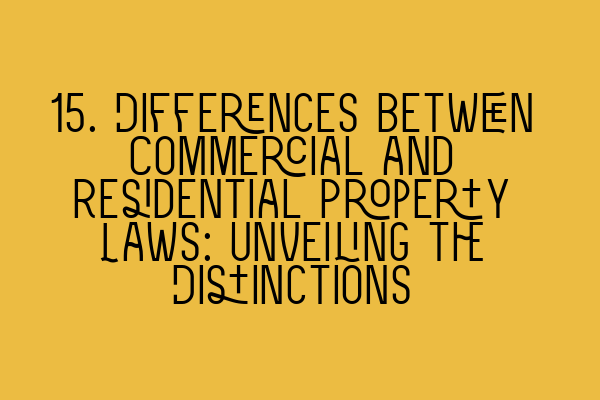15 Differences between Commercial and Residential Property Laws: Unveiling the Distinctions
Are you interested in delving into the intricate world of property law? Do you want to understand the differences between commercial and residential property laws?
In this blog post, we will uncover the 15 key dissimilarities between commercial and residential property laws. Whether you are a property owner, a tenant, or a legal professional, understanding these distinctions can greatly impact your dealings in the property market.
Before we dive in, let’s quickly recap the basics. Commercial property refers to buildings or land that is used for business or profit-making purposes such as offices, retail stores, warehouses, and industrial facilities. Residential property, on the other hand, encompasses properties used for residential purposes like homes, apartments, and condominiums.
Now, let’s explore the differences between these two branches of property law:
1. Purpose of Use: As mentioned earlier, the most fundamental distinction lies in the purpose of use. Commercial properties are primarily utilized for business activities, while residential properties are dedicated to housing.
2. Legal Protections: Residential properties often enjoy more legal protections, such as rent control and tenant rights, compared to commercial properties.
3. Lease Length: Commercial leases tend to have longer terms than residential leases. A typical commercial lease can last anywhere from three to ten years, whereas residential leases typically span one year or less.
4. Rent Negotiation: In commercial property, tenants usually have more negotiating power when it comes to rent terms and clauses, while residential tenants may have limited bargaining power.
5. Maintenance and Repair Responsibilities: Commercial tenants are typically responsible for more extensive maintenance and repair duties compared to residential tenants. Commercial leases often place a heavier burden on tenants to maintain the property.
6. Use Restrictions: Commercial properties may have more use restrictions in place due to zoning and other regulations. Residential properties, on the other hand, are generally subjected to fewer use restrictions.
7. Tax Considerations: Commercial properties are subject to different tax regulations and assessments compared to residential properties. Understanding these distinctions can have significant financial implications.
8. Insurance Requirements: Commercial property owners are typically required to carry more extensive insurance coverage to protect against business-related risks. Residential property owners have different insurance needs for their personal dwellings.
9. Financing Options: Financing options for commercial properties differ from those available for residential properties. Commercial property loans often have more complex terms and requirements.
10. Landlord-Tenant Relationships: The dynamics of landlord-tenant relationships vary between commercial and residential properties. Commercial leases generally involve more formal and business-oriented relationships.
11. Eviction Procedures: The eviction process differs significantly between commercial and residential properties. Commercial evictions typically involve complex legal proceedings, while residential evictions may have more streamlined processes.
12. Risk Factors: Commercial properties are typically associated with higher risk factors due to the nature of business activities conducted on the premises. Residential properties generally have fewer inherent risks.
13. Property Valuation: The valuation of commercial properties is typically based on income potential, while residential properties are often valued based on comparable sales in the area.
14. Planning and Development: Planning permissions and development regulations for commercial properties differ from those for residential properties. Understanding the specific requirements can be crucial for successful property development.
15. Legal Expertise: Due to the unique complexities of commercial property law, it is often recommended to seek legal advice from experts specializing in commercial property transactions. Residential property matters are generally more straightforward and may not require specialized legal assistance.
Understanding these key differences between commercial and residential property laws is essential for making informed decisions in the property market. Whether you are a landlord, tenant, or legal professional, knowledge of these distinctions can help navigate the legal complexities and ensure compliance with relevant regulations.
If you are preparing for the SQE exams and want to enhance your understanding of property law, be sure to check out our related articles:
– SQE 1 Practice Exam Questions
– SQE 1 Practice Mocks FLK1 FLK2
– SQE 2 Preparation Courses
– SQE 1 Preparation Courses
– SRA SQE Exam Dates
We hope this article has shed light on the distinctions between commercial and residential property laws. If you have any further questions or require legal assistance, do not hesitate to contact SQE Property Law & Land Law, where our team of solicitors are ready to provide expert advice tailored to your unique situation.
